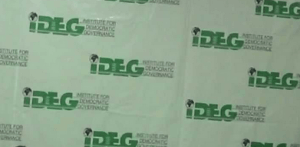It’s time to reform governance system – IDEG
 The Institute for Democratic Governance (IDEG), has called for governance reforms that would promote and support an inclusive multi-party democratic political system for sustainable national advancement.
The Institute for Democratic Governance (IDEG), has called for governance reforms that would promote and support an inclusive multi-party democratic political system for sustainable national advancement.
It said after many years of operating the present political governance system it had become clear that it was carefully crafted to serve the purpose of the military regime, which brought it into existence.
Mr Kwesi Jonah, a Senior Research Fellow at IDEG, in a presentation at the Institute’sPublic Conversation programme, in Accra on Monday, stated: “The accountability mechanisms are weak, participation restrictive and exclusionary politics entrenched.”
“It is no wonder, therefore, surprising that many public spirited Ghanaians have raised their voices loud and clear against the continuing retention of the system and called for urgent action to reform it in a way that would render it fit for the purpose in a vibrant multi-party democratic system.
Mr Jonah said the main cause of popular objection to the present system was that in its present form Ghana’s decentralised local government system was a grossly inappropriate foundation for the national multi-party political system.
The framers of the 1992 Constitution, he said, picked a local government system designed for a military regime and incorporated it wholesale into a multiparty democratic political system without change or modification.
“What we have as a nation, therefore, is a political superstructure which is multiparty-democratic in character superimposed on a non-party substructure in which elements of democracy such as accountability participation and inclusiveness are plainly missing or weak”.
IDEG, Mr Jonah said, was therefore, proposing especially to the Government, Political Parties, Members of Parliament, and civil society groups to work towards a reformed local government system where District Chief Executives were elected directly by voters in their districts, and on the ticket of a political party rather than being appointed by the President.
He said party participation must be key in district level elections and should be open to political parties, while ensuring the election of all Assembly Members, to abolish the present system of government appointees.
Mr Jonah said IDEG was also proposing the introduction of proportional representation to enhance the substantive representation of women and minorities, and improve the overall inclusiveness in governance.
The Common Fund Allocation to the Assemblies should not be less than 15 per cent of the total tax revenue, he said.
“Our view is that these proposals would enhance election peace, improve accountability and exclusion and raise inclusiveness in our democracy,” he said.
“We call on fellow Ghanaians to rally round this idea and bring the transformational change that will lift our democracy to the next level.”
The Public Conversation, which was an initiative by IDEG in collaboration with the Civic Forum Initiative (CFI) focuses on the topic: “Strengthening Democratic Development through Multi-Party Based Local Government: South Africa, Kenya and Ghana in Focus”.
It brought together Ghanaian participants from civil society, including academia, policy analysts and politicians, as well as guest speakers from South Africa and Kenya.
On the achievements of the decentralised government system over the past three decades, however, Mr Jonah, stated that the system had gone through a tremendous expansion, resulting in almost a 100 per cent increase in the number of its basic structures, from 110 in 1993 to 216 in 2012.
“The decentralised government system has in many ways served the nation well and that there is no doubt about its achievements, as service delivery in the districts has improved substantially, while local economic development has been sustained and local level democracy given a new lease of life,” he explained.
Dr Matlotleng Matlou, the Executive Director of Excelsior Consulting, South Africa, narrated his country’s political experiences, which he said, contained harrowing past history that served as critical lessons to encourage other countries, including Ghana, to strive to develop good governance structures to prevent conflicts.
Mr Donald Mogeni, a Public Policy Analyst and Social Accountability Advisor at World Vision, United Kingdom, also narrated Kenya’s political history that was also interspersed with violent unrests.
He, however, said the country was working towards building a strong multi-party democratic system to strengthen its democracy and consolidate peace.
Source: GNA
